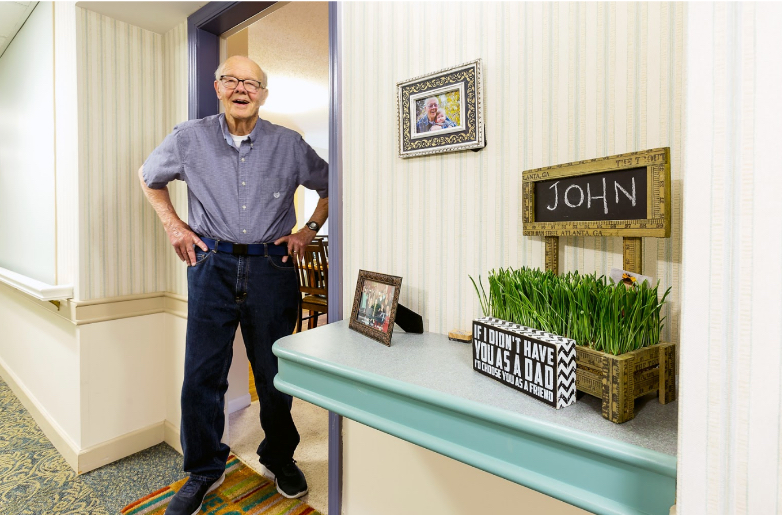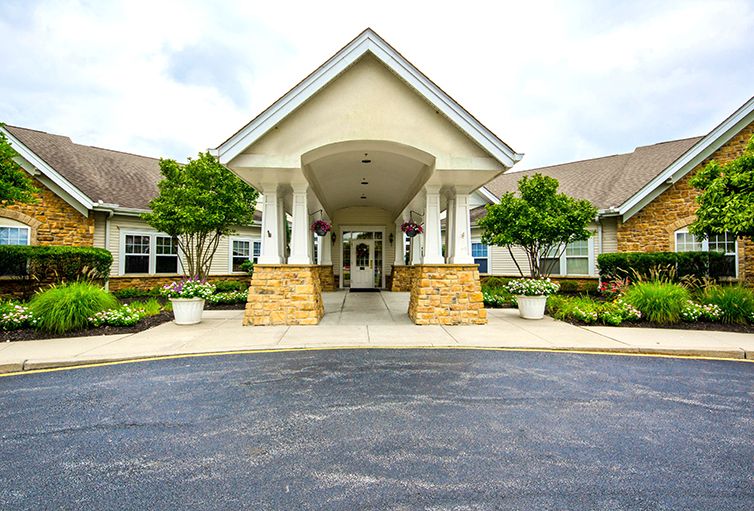The Impact of Personalized Memory Care on Mental Wellness
The Impact of Personalized Memory Care on Mental Wellness
Blog Article
All Concerning Memory Treatment Providers: Why Little Memory Care Homes Are an Excellent Selection
Memory care services play a vital role in sustaining people with Alzheimer's and dementia. Little memory care homes stand apart for their individualized strategy and intimate setting. With reduced staff-to-resident proportions, these homes promote stronger connections and customized care. Homeowners profit from improved social communications and a secure setting. As households check out choices, understanding the distinct advantages of small memory treatment homes becomes essential. What variables should be thought about when selecting the best home?
Recognizing Memory Care Provider
While several may know with basic elderly treatment options, comprehending memory treatment services is necessary for families dealing with the difficulties of cognitive decline. Memory care especially accommodates individuals with conditions such as Alzheimer's illness and various other forms of dementia. These solutions give an organized setting that focuses on improving the lifestyle for residents through specialized care and support.Memory care centers are created to guarantee security and protection, commonly including safeguarded settings to avoid roaming. Trained staff members are available all the time to assist with daily tasks, medication administration, and individual care. Additionally, memory treatment programs commonly include cognitive excitement activities, customized to involve locals and advertise psychological wellness. Family members can take advantage of understanding these services, as they enable educated decisions regarding their enjoyed ones' treatment, ensuring that their specific demands and choices are addressed in a helpful and caring way.
The Advantages of Little Memory Treatment Houses
Little memory care homes use unique benefits that can greatly improve the lifestyle for residents with cognitive problems. One significant benefit is the intimate environment, which enables tailored communications amongst personnel and locals. This smaller setting fosters significant relationships, lowering feelings of isolation and anxiousness typically experienced by individuals with memory issues.Additionally, the lower staff-to-resident proportion in tiny memory care homes enables caregivers to give even more mindful supervision and support. This strategy not only enhances safety but also advertises a sense of protection for the residents.Moreover, little memory care homes can adjust quickly to the unique needs and preferences of each citizen, allowing for a much more homelike environment. Such an atmosphere can encourage social engagement and participation in tasks, inevitably improving the day-to-day experiences of those living with cognitive impairments.
Personalized Treatment Plans for Locals
Individualized treatment plans are crucial in memory care homes, as they accommodate the distinct demands and choices of each local. These plans begin with comprehensive analyses performed by skilled experts, who examine cognitive abilities, clinical history, and personal interests. This tailored method guarantees that care is not only efficient however likewise considerate of each individual's dignity and autonomy.Moreover, customized treatment plans are versatile, enabling adjustments as residents' demands evolve gradually. This versatility cultivates a complacency and knowledge, which is essential for people dealing with memory challenges. Caregivers are trained to apply these strategies constantly, supplying assistance that aligns with the citizens' routines and preferences.Ultimately, customized treatment strategies boost the lifestyle for residents by advertising engagement, freedom, and well-being, making them a basic aspect of memory care solutions in tiny memory care homes.
Creating a Home-Like Environment
Creating a home-like setting is crucial for cultivating convenience and experience in memory care settings, as it considerably affects residents' emotional health. Little memory care homes typically prioritize personalized touches, such as warm shade palettes, household photos, and familiar furniture setups, which assist locals really feel more at convenience. Integrating aspects reminiscent of a traditional home, like comfortable living spaces and public areas, urges a feeling of belonging.Moreover, using all-natural light and outside rooms can improve the ambience, promoting leisure and serenity. Employee play a considerable duty in maintaining this environment by engaging with residents in a thoughtful manner, treating them like family. Routine activities, such as cooking or gardening, can additionally add to a home-like feel, supplying chances for citizens to get involved in meaningful experiences. In general, creating a nurturing atmosphere supports cognitive feature and psychological stability, making it an important element of memory treatment solutions.
Enhanced Social Communication and Community
Boosted social communication and community are essential elements of memory treatment solutions. By promoting customized social engagement and creating a family-like atmosphere, these services promote meaningful connections among residents. Group tasks and occasions even more motivate involvement, aiding people really feel much more included and supported.
Individualized Social Involvement
While social interaction is vital for total health, many people with memory problems often struggle to involve meaningfully with others. Individualized social interaction in memory care homes addresses this challenge by creating customized tasks that satisfy locals' one-of-a-kind rate of interests and abilities. By concentrating on private choices, caretakers can cultivate connections that reverberate deeply with each individual. Tasks such as art therapy, music sessions, and led discussions advertise cognitive stimulation and psychological expression. Additionally, small group settings urge friendship and enable for even more intimate communications, improving feelings of belonging. This approach not only combats sensations of isolation yet additionally equips residents to preserve a sense of identification, ultimately adding to enhanced psychological health and wellness and high quality of life.
Family-like Ambience
In a memory treatment setting, fostering a family-like environment substantially enhances social interaction and develops a sense of community amongst residents. Smaller sized memory treatment homes often focus on intimate atmospheres, enabling homeowners to form closer connections with one an additional and staff members. This nurturing ambience advertises trust, which is vital for people with memory problems. Locals are more likely to talk and share experiences, producing an encouraging network that minimizes sensations why not find out more of loneliness. The familiarity of common areas and regimens contributes to a feeling of belonging, better urging social communication (personalized memory care). In such settings, emotional bonds thrive, bring about improved total well-being and a better of life for citizens as they browse their daily experiences with each other
Team Activities and Events

Security and Safety Functions in Little Houses
Many tiny homes created for memory treatment include essential safety and safety and security functions to assure the health of citizens. These homes commonly use secure entry and leave indicate avoid straying, a typical problem among individuals with memory problems. Additionally, security systems and alarm system systems enhance surveillance, guaranteeing that personnel can without delay react to any kind of uncommon activities.Interior designs are tailored for safety and security, with minimized hazards such as sharp corners and clutter-free paths. Handrails and non-slip floor covering are commonly set up to decrease the threat of drops. Personnel are trained in emergency methods, ensuring they are prepared for numerous situations.Moreover, customized care strategies may include analysis of individual security demands, providing customized solutions for every resident. On the whole, these safety and security and safety and security attributes develop a nurturing environment where here locals can grow while maintaining their dignity and self-reliance.
Exactly how to Select the Right Memory Treatment Home
Just how can families ensure they choose the most ideal memory treatment home for their enjoyed ones? The choice needs cautious factor to consider of numerous variables. Family members ought to evaluate the facility's team qualifications and training, making sure that caregivers are experienced in managing memory-related conditions. Next off, it's vital to examine the home's setting, concentrating on safety and security features and whether it fosters a feeling of community and belonging. Checking out the facility can offer understanding into everyday tasks and the social atmosphere, which are vital for psychological stimulation and emotional well-being. Additionally, households ought to ask about the treatment strategies used, ensuring they are tailored to private needs. Ultimately, considering the home's place and access for family members gos to can contribute to a smoother shift. By addressing these aspects, family members can make an educated choice that prioritizes their liked one's comfort and lifestyle in a memory treatment setting.
Frequently Asked Questions
What Certifications Should Staff Members in Memory Treatment Homes Have?
Team members in memory treatment homes ought to have relevant qualifications, experience in dementia treatment, strong interaction abilities, and empathy. Recurring training in behavioral management and healing interventions enhances their capability to support citizens efficiently.
Just How Do Memory Care Provider Differ From Typical Assisted Living?
Memory care solutions focus specifically on people with memory impairments, giving customized assistance and structured atmospheres. In comparison, standard assisted living provides basic help with daily activities, doing not have the customized approach necessary for those with cognitive difficulties.
What Kinds of Tasks Are Supplied in Memory Care Houses?
Memory care homes generally offer a variety of activities designed to involve citizens. Usual options include art treatment, music sessions, cognitive games, physical exercises, gardening, and social occasions, all intended at boosting well-being and cognitive function.
Can Residents Bring Their Own Personal Belongings to Memory Care Homes?
Locals can usually bring their own personal belongings to memory treatment homes, permitting them to personalize their living room - personalized memory care. This practice helps produce an acquainted setting, advertising convenience and a feeling of identity for the people

Exactly How Are Relative Associated With the Treatment Refine?
Relative play an important role in the care process, often taking part in decision-making, attending treatment meetings, and offering emotional support. Their participation promotes a collective setting, enhancing the citizen's general health and top quality of life. While numerous might be familiar with general senior treatment alternatives, understanding memory treatment solutions is essential for households dealing with the obstacles of cognitive decrease. These services provide a structured atmosphere that concentrates on improving the top quality of life for homeowners through specialized care and support.Memory care facilities are designed to assure security and protection, commonly including safeguarded atmospheres to stop roaming. Customized treatment plans are crucial in memory treatment homes, as they provide to the distinct demands and preferences of each resident. Personnel participants in memory care homes must possess pertinent qualifications, experience in dementia treatment, solid communication skills, and compassion. Memory care solutions concentrate particularly on people with memory disabilities, supplying specialized support and structured settings.
Report this page